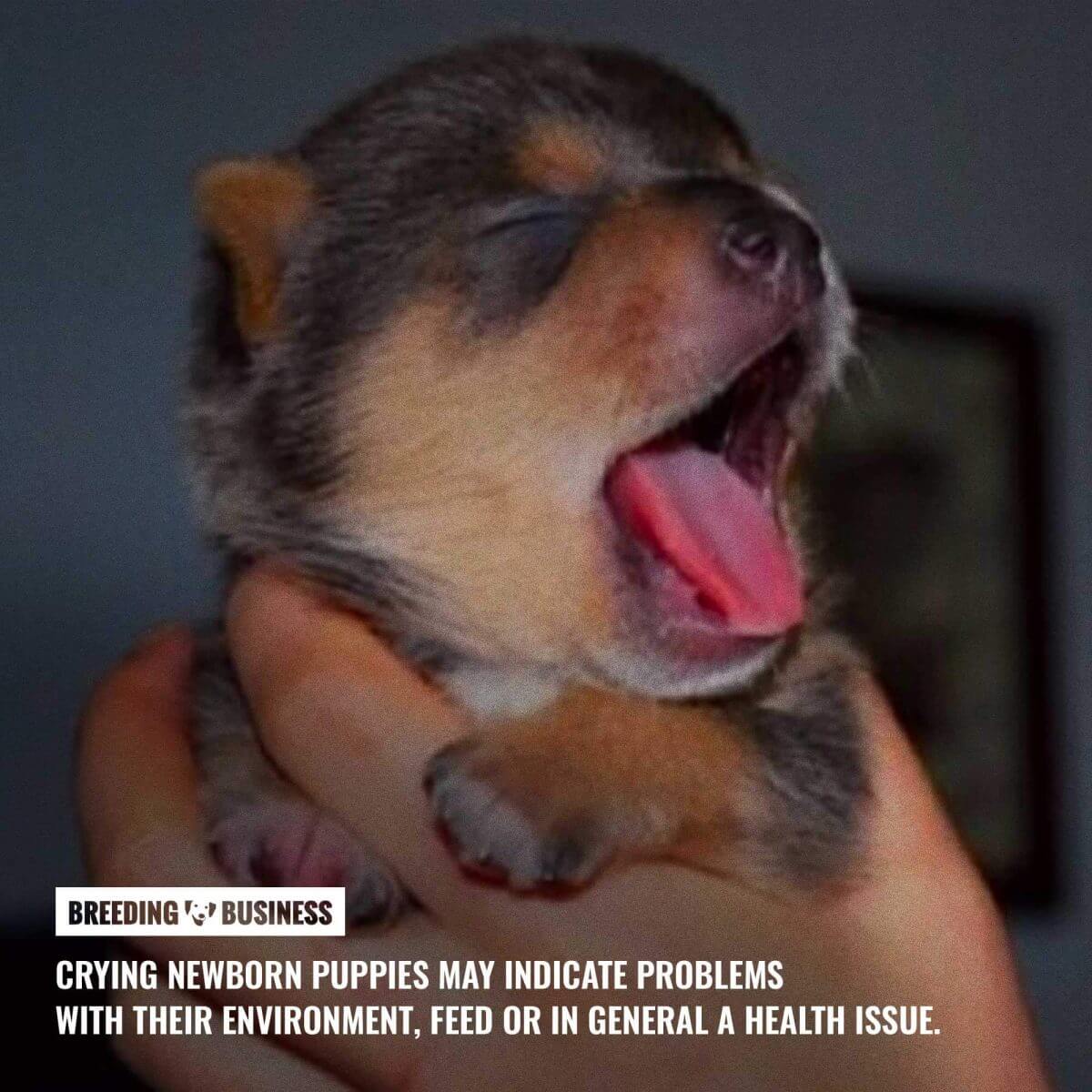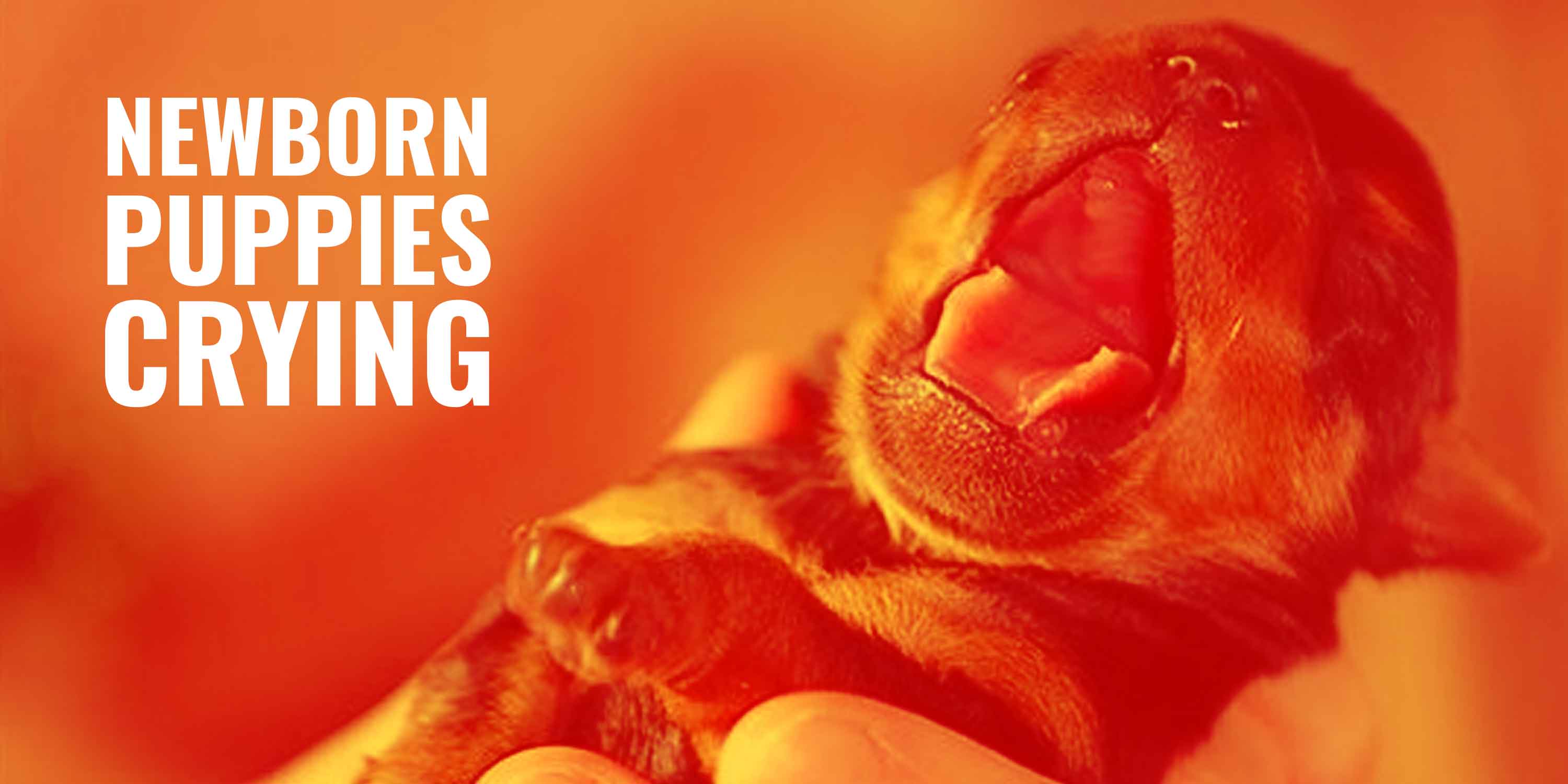Newborn puppies crying is quite worrisome for a dog owner. New owners commonly question why their puppies might be crying? The constant barking or whelping is their form of expression that requires your urgent attention. Similar to human infants, this is how newborn puppies are likely to communicate their requests to their caretakers.
Orphaned newborns are likely to cry a lot more since they require 24-hour care and the absence of their mother can lead to problems in their diet, growth, and maintaining the ideal temperature. Crying newborn puppies may indicate problems with their environment, feed, or health issue.
As a dog owner, it is upsetting to see your puppy cry to sleep! With such excessive crying, it is important to know what might be the possible reasons behind it and what you can do to ease them. Providing your puppy with proper care is vital to its development.
Why Do Newborn Puppies Cry?
There are multiple reasons your newborn puppy is crying. The crying could indicate an imbalance in their environment, which includes having the right temperature and an adequate level of comfort. Moreover, their cries can also be a sign of a lack of nursing, hunger, or a health problem that causes them discomfort.
It is important to attend to your crying newborn puppies especially if it continues for longer periods. Puppies need care and comfort to grow in a healthy manner. Since they are learning about their environment, it is likely that they are troubled by it and need your help! Often, the problem is as simple as the puppy’s need to eliminate.
At first, it is upsetting to be confused about what your newborn puppy wants. However, over time, dog owners start to recognize their newborn puppy’s cries and needs. They also get better at managing their puppies effectively. In addition to that, puppies too start to adapt and learn along the way.
[adwithin]
Puppy Needs Food
One of the major and more common reasons your newborn puppy cries is mostly due to hunger. It’s very easy to lose track of how much food intake a newborn puppy has. As puppies are growing, their diets can fluctuate from time to time.
They are likely to have a lot more food after an activity-filled day or will not enjoy the food at all if they feel under the weather. It is important to inspect their body language and recognize their needs.
If they are born weak, then it is a possibility that they struggle with suckling milk. This can cause problems with nursing the puppy and providing them with their required intake of food. It is important to hand feed such puppies and allow them to build stamina.
There could also be a problem with the mother dog, who could be facing problems with milk production. Your puppy is likely to cry after their feed, simply because they did not get as much as they require. It is necessary to inspect both the puppy and their mother and see whether the puppy is getting its desired amount of milk.
Sometimes the puppy cannot compete with their other siblings. This may lead to them getting weaker and not getting enough food. This is also a reason why you might find newborn puppies crying.
Moreover, if you notice that your newborn puppy cries right before a food, then it might be that they are not getting enough food or have an increased appetite. This is also a signal to increase the amount of food.
Right Temperature
Newborn puppies cry excessively often due to lack of warmth. Temperature is an essential aspect that dog owners must maintain for newborn puppies. It is important to know that puppies cannot regulate the temperature during the first two weeks of being born.
You are likely to find them cuddling with their mothers or their other siblings to achieve the ideal temperature. However, there might be reasons that the mother is pushing away her puppies. In such a case, you should visit your vet immediately to find out the difference in behavioral patterns.
Lack of warmth in newborn puppies can lead to growth abnormalities and digestive problems like constipation. Although it is important to maintain ideal temperatures and not let it get too warm. Dog owners can recognize from the newborn puppy crying and their body language to detect a problem.
If they are spread out and resting alone, it is because they feel too warm. On the other hand, if they are huddled together with crying, then it might be because of a lack of warmth. Try to adjust temperatures accordingly or pay a visit to the vet if necessary.
Check out our review of the best pet thermometers!
Needs to Eliminate
Newborn whelps cry when they have trouble passing stool. Mothers usually lick their newborn’s bottoms to stimulate them to eliminate. However, if the puppy is orphaned, then it is possible that they are struggling to excrete.
If your puppy does not eliminate properly, it can cause bloating and discomfort in their stomachs. Moreover, this bloating can turn into pain and uneasiness, which causes puppies to whelp. Most owners can take a warm gauze and stimulate puppies to eliminate with slow movements.
Some puppies also cry when they need to be burped to relieve them of the bloated stomach. This helps them calm down and rest. Otherwise, you might find your puppy struggling and in discomfort.
Medical Issues
Newborn puppies crying may be a symptom to indicate various health issues. Just like a human infant, crying is a way of communicating pain and discomfort. The smart choice is to go to and get your puppy checked by a qualified veterinarian.
Get the puppy checked for birth defects like a cleft palate. Their behavior can also indicate problems with their digestive system. Notice signs for vomiting, dizziness, and diarrhea. Some elements in their diet can cause such problems. Cow milk is known to cause digestive dysfunction in newborn puppies.
Their health can also be a result of their environment. Temperature changes can lead to your puppy becoming hypoglycemic or hypothermic. This can alter their blood levels and effects their activity. It may be causing your puppy to be lethargic and fatigued.

Need Mommy
Newborn whelps cry when they seek love and attention from their mother. This can get difficult if they have been orphaned. Dogs are social animals, and they need time to adjust to new environments and deal with abandonment. This is why they require the constant care of their mothers.
Ideally, the owner should spend time with their puppy and provide them with love and care they might need. Newborn puppies do not deal well with isolation, so owners can try to keep them around and interact with them from time to time. They can get bored and want someone or something to play and interact with them.
Some newborn puppies also cry out of fear. They might not find some faces or other pets in the house to be very welcoming. They can get easily startled by loud, intimidating sounds as well. Owners are likely to find them hiding, whimpering, and crying as a defense mechanism.
Owners should ease such puppies into new situations and try to comfort them with love and care to make their transition into a new home as smooth as possible. Over time, puppies gain confidence and are not as needy of their mothers, protecting them.
Caring for A Newborn Puppy
Having a newborn puppy is exciting and heartwarming. However, they do require certain attention and care from their owners that will ensure their health and safety. There are multiple steps you can take to take care of your newborn puppy and protect them fro any sort of discomfort.
Ideal Temperature
Start by creating a safe space for them, for this, a small whelping box will make do. This is where the puppies can huddle up with their mothers and siblings. It is important to make sure the temperature of their surroundings ideal for them.
If it is still too cold, you should use a heating pad to maintain the temperature. This allows them to be comfortable and is extremely important for their development. Huddling together with their mothers and staying warm allows the puppies to develop a bond as well.
Nursing and Diet
Problems with a puppy’s diet can cause them a lot of discomforts. As soon as puppies are born, you can also help them learn how to nurse. Newborn puppies are blind and deaf. You can help them locate their mother’s milk ducts and help them get comfortable with the process.
Hygiene is vital to newborn puppies. They do not have an active immune system yet, hence, make sure people wash their hands before coming in contact with them. The mother’s first milk is the only source of immune defense for the first few weeks. This also includes keeping dirty shoes and apparel away from the area they sleep and feed in.
How to Deal with a Newborn Puppy Crying?
[adwithin]
Crying puppies indicate distress, which is caused by environmental or health factors. You should start by inspecting the puppy for a few hours. Examine their diet, sleep, and behavioral patterns. Their body language can very well translate the issues they might be dealing with.
The problem might be as simple as their diet. If they’re not getting enough food, you can ask recommendations from your vet about formula milk. Moreover, you could also get the mother checked up if she is not attending to their puppies in a normal manner or giving them the adequate feed. There could be problems with her milk production.
It is necessary for you to take a trip to the vet and get an overall checkup from time to time. Get your puppy screened for any abnormalities or congenital disabilities. The vet can inspect the puppy for a bloated stomach, pain, and any sort of discomfort that is causing them to cry!
Orphaned Puppy Crying
Dog breeders can be stressed if their puppies quickly become orphans. Without the mother, a puppy will require constant care for the first two weeks of being born. Try to purchase a substitute for the milk and feed the puppy every 2 hours. Just born dogs cry to alert you of their hunger.
You can also take a warm cloth and press it against their bottoms to stimulate them to urinate and defecate. You can also start immunizing them after they are at least six weeks of age. Make sure they get deworming shots and proper treatment for fleas after a certain age.
Taking care of a newborn puppy is a full-time job. However, the puppies do learn and adjust with time. They learn how to eat, drink, and maintain their temperature on their own. On your end, you will learn to distinguish their different types of crying and react appropriately.

2 comments on “Newborn Puppies Crying – Common Reasons and Solutions”
Newborn puppy Will not stop crying. He goes in circles constantly when he’s not sleeping.. Like his nose touches his tail. I’m bottle feeding every 2 hours like I should. What’s wrong with him and what do I do to help him?
This sounds like liver shunts to me!